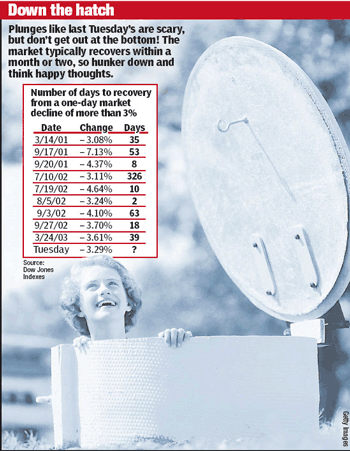Why does this stock market remind us of the Kobe Club, the New York City restaurant with 2000 samurai swords suspended from the ceiling? Well, it has to do with an old stock market expression: “Never try to catch a falling knife” and the following observation from Monday’s EWFF Short Term Update: “We continue to be struck by how many commentators view this as a great buying opportunity.” This graphic from Sunday’s New York Post captures the underlying sentiment :

Headline after headline pounds out the same “don’t worry” refrain:
Now Isn't Time to Panic Over Market
LubbockOnline.com, March 8, 2007
Prepare for Yet More Bull in the Market
Times Online, March 8, 2007
Wall Street Still Running With Bulls
Denver Post, March 8, 2007
Accept Market's Volatility
Monterey County Herald, CA, March 8, 2007
It’s a Fluctuation, Not a Market Crash: No Cause for Panic
Today's Zaman, Turkey – March 5, 2007
Why I'm the Mr. Happy of the Stock Market
Spectator, UK – March 7, 2007
And these are just from the first of 30 pages of headlines that pop up when you punch the words “stocks” and “panic” into Google news. One favorite is from Main Today: “The Sky Is Falling! Why You Shouldn’t Panic About the Stock Market.” The article soothes readers with bold face sections titled, “This is Normal,” “This is Natural,” “You’re OK,” and “You Can’t Predict or Control It.” Some measures of sentiment are somewhat oversold right now, but this is probably more than offset by an incredible, and perhaps unprecedented, collective urge to buy the dip. Even the decimated subprime mortgage area, which we covered here yesterday, is a target. In the three weeks leading up to the New Century Financial blow-up discussed here yesterday, three separate firms – Stifel Financial, UBS Ag and Bear Stearns – all upgraded their ratings on the stock. On Monday, several appeared to come to their senses saying New Century “likely faces liquidation or bankruptcy,” but then one day later on March 6, The Wall Street Journal reported:
Subprime Wreckage Entices Bargain Hunters
Some Wall Street Banks
Bet Big on a Recovery
In Risky-Loan Game
As fallout spread from soaring defaults on riskier home mortgage loans, some big investors see a recovery coming and are preparing to increase their bets on the so-called subprime market.
The article adds that “carnage only encourages bargain hunters.” The stock market rebound through the course of this week is another example of how well-honed this reflex is. The vast assortment of targets for this knee-jerk response is covered in today’s Short Term Update, which features an up-to-the-minute look at the all-the-same market scenario we’ve been tracking through a multi-month topping pattern. A good approximation of the danger to investors is captured by this picture.

Bonzi!: The Kobe Club Ceiling with its 2000 Samurai swords
Like the blades suspended from the ceiling of the Kobe Club, a vast assortment of markets are on the ceiling and poised over the heads of investors; and relative to the usual knife-like threat of a decline, they pose the razor-sharp potential of these samurai swords. Despite the considerable breadth of the mounting declines and the likely speed that was hinted at on February 27, the subprime mortgage experience suggests that investors will try to catch them as they fall, for a while anyway. The faint of heart, says a giant media chorus, should do everything in their power to stay put. No matter what, in other words, don’t get out of the way. “The natural gut reaction is to look around for some possible ‘action’ to take,” says Canada’s Financial Post. “Unfortunately, the more one's nerves are jittery, the more one is tempted to take the wealth-reducing action known as ‘sell.’” Now that the word "sell" has become tantamount to wealth reduction, the sharp edges of a real bear market can let fly and realize full destructive capacity. |
